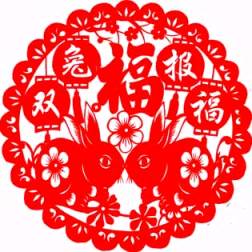This year is the Chinese year of the rabbit and there are a number of Chinese proverbs and idioms feature references to the rabbit, for example: ‘Foxes grieve over the death of rabbits’, ‘A rabbit’s tail cannot be long’, ‘When cunning hares have all been hunted, fleeing hounds will be cooked as food’, ‘A sly rabbit has three openings to its den’, ‘Waiting for a rabbit to hit upon a tree and be killed in order to catch it’ and etc.
 |
| 守株待兔 |
The saying ‘a rabbit’s tail cannot be long’ refers to who resort to treachery cannot get away for it very long and ‘Foxes grieve over the death of rabbits’ reflect a person’s sad feeling for the death or misfortunes of his companions.
The proverb ‘When cunning hares have all been hunted, fleeing hounds will be cooked as food’ was once cited by the wise man Fan Li, an advisor in the state of Yue in the Spring and Autumn Period (722-481 BC). It is used to mean trusted aides are eliminated when they have outlived their usefulness. Fan Li was trying to advice his friend to leave the King who, in his opinion, was a man with whom one can weather difficult times together but not happiness, with whom one can weather danger together but not live peace together. It is therefore important to leave him before he harms you. Click here to read more about Fan Li’s advice.
The proverb ‘A sly rabbit has three openings to its den’ indicates having more hiding places or methods. It is used to suggest the need for backup plans or escape routes in dealing with uncertainties. It comes from a story in ‘Stratagems of the Warring States’ about Feng Xuan who had said: ‘Only with three burrows can a wily hare avoid the risk of death.’ Click here to read the story.
The proverb ‘Waiting for a rabbit to hit upon a tree and be killed in order to catch it’ comes from ‘The Five Vermin’ in ‘The Works of Han Feizi’. It advises that one should not wait for unexpected gains by leaving things to chance and luck, or one should not hope to get rewards without hard work.
Once in the Song Land there was a farmer, in whose field there was a tree. One day a rabbit ran toward the tree, too fast as to hit into the tree, broke its neck and died. From then on, he laid down his tools, doing nothing but wait under the lucky tree, hoping for another rabbit. But no more rabbit came, and the farmer turned out to be the laughing stock of his fellow countrymen.
.
.
今年是华人的兔年,有不少华人的成语和俗语是与兔子有关的,例如:‘兔死狐悲’,‘兔子尾巴长不了’,‘兔死狗烹’,‘狡兔三窟’,‘守株待兔’,等等。
俗语‘兔子尾巴长不了’指的是背信弃义的事是维持不了多久的,而‘兔死狐悲’反映因同类的死亡或悲事而感到悲伤。
成语‘兔死狗烹’曾被春秋时期(公元前722年至481年)越国大臣范蠡引用过,比喻事情成功以后,把出过力的人杀掉。范蠡尝试劝告他的朋友离开越王,认为越王‘可与共患难,而不可共处乐;可与履危,不可与安。’所以应该在不被他杀害之前离开。请点击这里阅读有关故事。
成语‘狡兔三窟’指兔子有多个隐藏处或指多个方法。它用来指明需要后备计划或者脱险通道来应付变化无常的局势。来自《战国策》冯谖的故事:‘狡兔有三窟,仅得免其死耳。’请点击这里阅读这个故事。
成语‘守株待兔’来自《韩非子•五蠹》,劝告我们不要听天由命,以来运气,或期望不劳而获。
宋人有耕田者。田中有株,兔走,触株折颈而死。因释其耒而守株,冀复得兔。兔不可得,而身为宋国笑。












